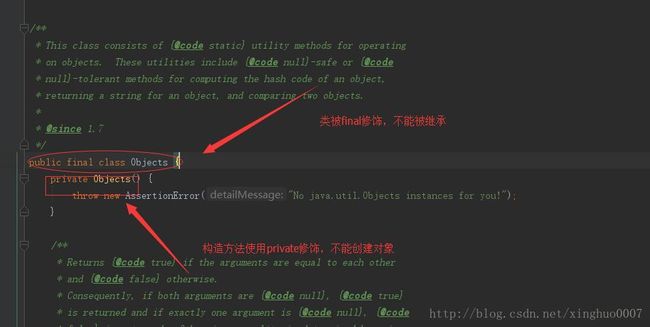- BubbleUtils贝塞尔曲线常用工具类
Peakmain
publicclassBubbleUtils{/***dip转换成px**@paramdip*@paramcontext*@return*/publicstaticintdip2px(floatdip,Contextcontext){DisplayMetricsdisplayMetrics=context.getResources().getDisplayMetrics();return(int)
- 五维突破Twenty-Eight|学生创造策略单
墨香雪Silvia
这是我参与勇气读书会打卡第116天阅读书目:《五维突破:互联网+教育》阅读章节:第五维度:学生创造【学生创造策略单】读书笔记分享:杨晓哲博士在本小节为我们介绍了几个学生在学习过程中使用的软件、网站和工具的典型类别,我们可以看到学生正在开启一种不一样的学习方式。(1)常用工具类1.Wiki百科或百度百科这两个平台涵盖了各个领域的信息,可以说无所不能、无所不包。百科强调用户的参与和奉献精神,调动了互联
- java篇 常用工具类 0x03:Iterator 与 Iterable 接口
Kevin骑熊猫打老虎
javajava
文章目录Iterator接口Iterable接口手动实现Iterable接口示例Iterator接口Iterator接口在java.util包中。实现了Iterator接口的类就可以支持遍历操作。publicinterfaceIterator{//只需要关注到这两个抽象方法booleanhasNext();//还有没有下一个元素Enext();//返回下一个元素}Iterable接口Iterabl
- FTP与SFTP 以及FTP常用工具类
salt丶
FTP与SFTP的区别FTP是文件传输协议。在网站上,如果你想把文件和人共享,最便捷的方式莫过于把文件上传到FTP服务器上,其他人通过FTP客户端程序来下载所需要的文件。FTP进行文件传输需要通过端口进行。一般所需端口为:控制链路—TCP端口21。控制器端。用于发送指令给服务器以及等待服务器响应。2.数据链路---TCP端口20。数据传输端口。用来建立数据传输通道的。主要用来从客户向服务器发送一个
- 常用工具类-Objects
杀死一只知更鸟debug
Java知识回顾java开发语言
常用工具类-Objects①判断对象是否为空②判断两个对象是否相等③比较两个对象④判断两个数组是否相等Objects工具类位于java.util包中,提供了对对象操作的一些实用方法①判断对象是否为空isNull()判断对象是否为空noNull()判断对象是否不为空requireNull()检查对象是否为null,如果为null则抛出NullPointerException异常,否则返回该对象。In
- 常用工具类-Collections
杀死一只知更鸟debug
Java知识回顾开发语言java
常用工具类-Collections排序操作查找操作填充操作判断集合是否有交集不可变集合java.util.Collections类是一个工具类,它包含了一些静态方法,用于操作集合(如列表和映射)。这个类主要用于创建不可修改的集合、填充集合、替换元素等。基本每个方法都是见名知意的。下面练习几个常用的方法排序操作reverse(Listlist)反转顺序。shuffle(Listlist)洗牌,将顺序
- Java文件操作常用工具类
Basililon
工具类Javajava前端数据库
1.引言在Java开发中,经常需要对文件进行读取、写入、复制、删除等操作。为了简化这些操作,提高开发效率,我们可以使用一个常用的文件操作工具类。本文将介绍一个常用的Java文件操作工具类,并提供详细的使用说明和示例。2.工具类介绍工具类的名称:FileUtil工具类的功能:提供文件相关的操作方法,包括文件读取、写入、复制、删除等。3.工具类示例及使用说明以下是FileUtil工具类的代码示例:im
- Spring之工具类
kenewstar
Springspring工具类
Spring之常用工具类日常学习开发中,项目中经常需要用到各种工具类,而Spring框架中为我们提供了一些列工具,我们可以在不引用其他包的情况下,使用这些工具也能满足常规需求。断言工具AssertpublicstaticvoidtestAssert(){//false将会抛出IllegalStateException异常Assert.state(false,"状态异常");//自定义消息时,传递一
- java常用工具类【如spring 常用工具类,IO流常用工具类等】,持续更新
ljh_learn_from_base
javaspring常用工具类
java常用工具类,持续更新importorg.springframework.core.io.ClassPathResource;importorg.springframework.core.io.FileSystemResource;importorg.springframework.core.io.Resource;importorg.springframework.util.Resourc
- 【常用工具类】ObjectUtils 全面总结 ,真的太方便了
乐乐家的乐乐
java字符串后端
一、来源ApacheCommons-Lang3二、SpringBoot集成org.apache.commonscommons-lang33.12.0三、常用方法总结1、isEmpty(Objectobj)检查对象是否为空。如果对象为null或者为空字符串、空数组、空Collection、空Map或者空Iterator,则返回true;否则返回false。Stringstr="";booleanem
- 提升编程效率的利器: 解析Google Guava库之常用工具类-40个示例(七)
地瓜伯伯
工具guavajavaspringspringcloudspringbootjava-eejvm
Guava库是一组来自Google的核心Java库,其设计目的是为了简化Java开发过程,提高开发效率。这个库包含了大量实用的API,可以帮助开发者解决日常开发中遇到的各种问题。提升编程效率的利器:解析GoogleGuava库之集合篇Immutable(一)提升编程效率的利器:解析GoogleGuava库之集合篇Multimap(二)提升编程效率的利器:解析GoogleGuava库之集合篇BitM
- IDEA常用插件(本人常用,不全)
北风toto
次要的个人笔记intellij-ideajavaide
文章目录一、图标提示类插件1、Lombok插件(用户配合lombok依赖的工具)2、MybatisX插件3、GitToolBox4、VUE.js5、ESLint二、代码自动生成插件1、EasyCode插件:自动生成代码神器2、GsonFormat三、常用工具类1、IDEEvalReset插件(重置体验时间)2、Translation插件(中英文翻译)3、RedisHelper:Redis助手4、R
- Flutter 常用工具类库common_utils
老码思途
学习工具flutter
地址:https://pub.flutter-io.cn/packages/common_utils#-readme-tab-Dart常用工具类库common_utils1、TimelineUtil:时间轴.(新)2、TimerUtil:倒计时,定时任务.(新)3、MoneyUtil:精确转换,元转分,分转元,支持格式输出.(新)4、LogUtil:简单封装打印日志.(新)5、DateUtil:日
- Java常用工具类
花开半時偏妍
1org.apache.commons.io.IOUtilscloseQuietly:关闭一个IO流、socket、或者selector且不抛出异常,通常放在finally块toString:转换IO流、Uri、byte[]为Stringcopy:IO流数据复制,从输入流写到输出流中,最大支2GBtoByteArray:从输入流、URI获取byte[]write:把字节.字符等写入输出流toInp
- Java 常用工具类--Java异常
磊_5d71
处理程序运行阶段的错误,不是编译阶段。image.png异常处理分类抛出异常捕获异常image.pngpackagecom.alan.test;importjava.util.Scanner;publicclassTryDemoOne{publicstaticvoidmain(String[]args){/*//定义两个整数,输出两数之商intone=12;inttwo=2;22System.ou
- 6 - 常用工具类
无系之舟
Java基础java开发语言
目录1.Scanner扫描控制台输入1.1扫描控制台输入1)nextLine2)nextInt3)其他方法1.2扫描文件1.3查找匹配项2.Arrays数组工具2.1创建数组1)copyOf2)copyOfRange3)fill2.2比较数组2.3数组排序2.4数组检索2.5数组转流2.6打印数组2.7数组转List2.8setAll2.9parallelPrefix3.StringUtils3.
- Redisson 源码解析 - 分布式锁实现过程
小毕超
源码分析分布式
一、Redisson分布式锁源码解析Redisson是架设在Redis基础上的一个Java驻内存数据网格。在基于NIO的Netty框架上,充分的利用了Redis键值数据库提供的一系列优势,在Java实用工具包中常用接口的基础上,为使用者提供了一系列具有分布式特性的常用工具类。使得原本作为协调单机多线程并发程序的工具包获得了协调分布式多机多线程并发系统的能力,大大降低了设计和研发大规模分布式系统的难
- FileUtils常用方法 - commons-io常用工具类
努力搬砖 ing
Java常用工具FileUtils文件操作
FileUtils常用方法FileUtils.getFile=>获取指定文件Filefile=FileUtils.getFile("D://test/test1/123.txt");FileUtils.getFile=>获取指定目录下的:"lalala.txt","lalala2.txt"Filefile1=FileUtils.getFile(newFile("D://test/test1"),"
- Java基础复习资料------继承与多态 / jdk安装/记事本程序运行/变量/对象,属性,方法,构造方法,重载方法,重写方法/多态/异常/多线程等等...持续更新中 (生活举例+代码举例+图片))
悟道子HD
java程序设计语言java开发语言intellij-idea后端
Java基础复习资料jdk安装运行记事本程序变量/常量程序结构八大基本数据类型对象属性方法1.构造方法2.重载方法3.重写方法其他函数方法thissuper类继承extends接口implements/interface多态(考)包装类抽象类abstract数据封装set/get方法异常多线程常用工具类集合框架Iterator迭代器(遍历)父接口泛型e/E栈与队列文件操作文件操作输入输出流(考)待
- 关于JAVA的常用工具类问题
雾岛听风来
java开发语言
问题聚合:1.请列举你所知道的各种异常(至少两种)?2.常见的异常类型有哪些?3.如何自定义异常?4.包装类的常用方法有哪些?5.inta=3,Stringb=“3”,请问a==b吗?6.Java中的异常处理关键字是什么?7.Java中throw和throws关键字有什么区别?8.集合和数组的区别?9.IO流的分类?1.请列举你所知道的各种异常(至少两种)?异常是指在程序运行过程中发生的意外情况,
- spring常用工具类
w_t_y_y
Spring
一、org.springframework.util.Assert:它断定某一个实际的运行值和预期想一样,否则就抛出异常。Spring对方法入参的检测借用了这个概念,其提供的Assert类拥有众多按规则对方法入参进行断言的方法,可以满足大部分方法入参检测的要求。这些断言方法在入参不满足要求时就会抛出IllegalArgumentException。例:publicBooleanexportCrow
- JavaSE学习笔记 Day14
白斑马不是斑马
JavaSE笔记java
JavaSE学习笔记Day14个人整理非商业用途,欢迎探讨与指正!!«上一篇文章目录JavaSE学习笔记Day14···十二、内部类12.1成员内部类12.2静态内部类12.3局部内部类12.4匿名内部类12.5内部类的应用12.6内部类中的this12.7内部类的好处十三、常用工具类13.1Object类13.1.1概念13.1.2Object类中的常用方法···十二、内部类定义在一个类的内部,
- SpringBoot+SpringSecurity+MybatisPlus+Vue3小项目摘录(二)
许锅锅啊
SpringSecurityMybatisPlusSpringBootspringboot后端javavisualstudiocodemysql
文章目录SpringSecurity框架引入以及几个常用工具类几个常用的工具类介绍jwt相关1)最常使用的JWT这种方案有一些缺点:JWT正好可以解决这些问题:可以看出JWT以不同颜色区分,两个小数点隔开,分为了三部分:也可以参考hutool.com中的工具类哦我之前已经封装过一些工具了类,在这里就直接拿来使用了JWT的工具类:String常用字符串操作的工具类:后台跨域处理的配置类:编写基本的请
- JAVA常用工具类-【3】判断是否是JSON
王者鳜錸
json
1、判断是不是JSON字符串packagecom.day.util;importorg.apache.commons.lang.StringUtils;importcom.alibaba.fastjson.*;publicclassIsJSON{publicstaticvoidmain(String[]args){StringjsonString="{\"fileType\":\"pdf\",\"
- Windows常用命令
O_MMMM_O
windowswindows
文章目录一、Windows下Shell命令概述二、常用Shell程序命令大全Windows常用工具类常用管理配置工具一些高级配置管理三、一些Shell程序命令详解一、Windows下Shell命令概述Windows的Shell命令又是Windows的CMD命令。而cmd命令又是原来MS-DOS系统保留下来.Shell来源路径与配置对应的命令资源配置在windows的环境变量中:WindowsShe
- 【SpringBoot实战】常用工具类总结
积雨辋川
Javaspringboot后端java
【SpringBoot实战】常用工具类总结在SpringBoot项目中,不可避免地需要使用一些工具类来来提升我们的开发效率。常用的工具类有全局异常处理类、统一返回结果类、MyBatisPlus配置类、Swagger配置类等。尽管不同项目的配置类的代码不尽相同,但主要逻辑还是类似的,经过相应修改可以应用于项目中。因此本篇文章总结了SpringBoot项目常用的配置类,并将会持续更新。1.MyBati
- SpringBoot的常用工具类
紫陌红尘Oo
断言断言是一个逻辑判断,经常用于检查不应该发生的情况Assert关键字在JDK1.4中引入,可通过JVM参数-enableassertions开启在SpringBoot中提供了Assert断言工具类,通常用于数据合法性检查//要求参数object必须为非空(NotNull),否则抛出异常,不予放行//参数message参数用于定制异常信息。voidnotNull(Objectobject,Stri
- Java 常用工具类(35) : List均匀分组
Lxinccode
javalistwindowsList均匀拆分
importjava.util.ArrayList;importjava.util.List;/***@Author:liyue*@Date:2022/08/12/23:53*@Description:*/publicclassListUtil{/***将一个list均分成n个list**@paramsource*@return*/publicstaticList>averageAssign(Li
- Flutter开发常用第三方库分享
JamieChen
目前收集到的一些常用库库功能dio网络库provider状态管理flutter_2d_amap高德2D地图cached_network_image图片加载fluro路由管理flutter_oktoastToastcommon_utilsDart常用工具类库flutter_slidable侧滑删除flustarsFlutter常用工具类库flutter_swiperFlutter轮播组件url_la
- java生日正则表达式_Java编程基础15——正则表达式&常用工具类
努力奋斗的Brian
java生日正则表达式
1_正则表达式的概述和简单使用A:正则表达式是指一个用来描述或者匹配一系列符合某个语法规则的字符串的单个字符串。其实就是一种规则。有自己特殊的应用。作用:比如注册邮箱,邮箱有用户名和密码,一般会对其限制长度,这个限制长度的事情就是正则表达式做的B:案例演示需求:校验qq号码.1:要求必须是5-15位数字2:0不能开头3:必须都是数字a:非正则表达式实现b:正则表达式实现2_字符类演示A:字符类[a
- 微信开发者验证接口开发
362217990
微信 开发者 token 验证
微信开发者接口验证。
Token,自己随便定义,与微信填写一致就可以了。
根据微信接入指南描述 http://mp.weixin.qq.com/wiki/17/2d4265491f12608cd170a95559800f2d.html
第一步:填写服务器配置
第二步:验证服务器地址的有效性
第三步:依据接口文档实现业务逻辑
这里主要讲第二步验证服务器有效性。
建一个
- 一个小编程题-类似约瑟夫环问题
BrokenDreams
编程
今天群友出了一题:
一个数列,把第一个元素删除,然后把第二个元素放到数列的最后,依次操作下去,直到把数列中所有的数都删除,要求依次打印出这个过程中删除的数。
&
- linux复习笔记之bash shell (5) 关于减号-的作用
eksliang
linux关于减号“-”的含义linux关于减号“-”的用途linux关于“-”的含义linux关于减号的含义
转载请出自出处:
http://eksliang.iteye.com/blog/2105677
管道命令在bash的连续处理程序中是相当重要的,尤其在使用到前一个命令的studout(标准输出)作为这次的stdin(标准输入)时,就显得太重要了,某些命令需要用到文件名,例如上篇文档的的切割命令(split)、还有
- Unix(3)
18289753290
unix ksh
1)若该变量需要在其他子进程执行,则可用"$变量名称"或${变量}累加内容
什么是子进程?在我目前这个shell情况下,去打开一个新的shell,新的那个shell就是子进程。一般状态下,父进程的自定义变量是无法在子进程内使用的,但通过export将变量变成环境变量后就能够在子进程里面应用了。
2)条件判断: &&代表and ||代表or&nbs
- 关于ListView中性能优化中图片加载问题
酷的飞上天空
ListView
ListView的性能优化网上很多信息,但是涉及到异步加载图片问题就会出现问题。
具体参看上篇文章http://314858770.iteye.com/admin/blogs/1217594
如果每次都重新inflate一个新的View出来肯定会造成性能损失严重,可能会出现listview滚动是很卡的情况,还会出现内存溢出。
现在想出一个方法就是每次都添加一个标识,然后设置图
- 德国总理默多克:给国人的一堂“震撼教育”课
永夜-极光
教育
http://bbs.voc.com.cn/topic-2443617-1-1.html德国总理默多克:给国人的一堂“震撼教育”课
安吉拉—默克尔,一位经历过社会主义的东德人,她利用自己的博客,发表一番来华前的谈话,该说的话,都在上面说了,全世界想看想传播——去看看默克尔总理的博客吧!
德国总理默克尔以她的低调、朴素、谦和、平易近人等品格给国人留下了深刻印象。她以实际行动为中国人上了一堂
- 关于Java继承的一个小问题。。。
随便小屋
java
今天看Java 编程思想的时候遇见一个问题,运行的结果和自己想想的完全不一样。先把代码贴出来!
//CanFight接口
interface Canfight {
void fight();
}
//ActionCharacter类
class ActionCharacter {
public void fight() {
System.out.pr
- 23种基本的设计模式
aijuans
设计模式
Abstract Factory:提供一个创建一系列相关或相互依赖对象的接口,而无需指定它们具体的类。 Adapter:将一个类的接口转换成客户希望的另外一个接口。A d a p t e r模式使得原本由于接口不兼容而不能一起工作的那些类可以一起工作。 Bridge:将抽象部分与它的实现部分分离,使它们都可以独立地变化。 Builder:将一个复杂对象的构建与它的表示分离,使得同
- 《周鸿祎自述:我的互联网方法论》读书笔记
aoyouzi
读书笔记
从用户的角度来看,能解决问题的产品才是好产品,能方便/快速地解决问题的产品,就是一流产品.
商业模式不是赚钱模式
一款产品免费获得海量用户后,它的边际成本趋于0,然后再通过广告或者增值服务的方式赚钱,实际上就是创造了新的价值链.
商业模式的基础是用户,木有用户,任何商业模式都是浮云.商业模式的核心是产品,本质是通过产品为用户创造价值.
商业模式还包括寻找需求
- JavaScript动态改变样式访问技术
百合不是茶
JavaScriptstyle属性ClassName属性
一:style属性
格式:
HTML元素.style.样式属性="值";
创建菜单:在html标签中创建 或者 在head标签中用数组创建
<html>
<head>
<title>style改变样式</title>
</head>
&l
- jQuery的deferred对象详解
bijian1013
jquerydeferred对象
jQuery的开发速度很快,几乎每半年一个大版本,每两个月一个小版本。
每个版本都会引入一些新功能,从jQuery 1.5.0版本开始引入的一个新功能----deferred对象。
&nb
- 淘宝开放平台TOP
Bill_chen
C++c物流C#
淘宝网开放平台首页:http://open.taobao.com/
淘宝开放平台是淘宝TOP团队的产品,TOP即TaoBao Open Platform,
是淘宝合作伙伴开发、发布、交易其服务的平台。
支撑TOP的三条主线为:
1.开放数据和业务流程
* 以API数据形式开放商品、交易、物流等业务;
&
- 【大型网站架构一】大型网站架构概述
bit1129
网站架构
大型互联网特点
面对海量用户、海量数据
大型互联网架构的关键指标
高并发
高性能
高可用
高可扩展性
线性伸缩性
安全性
大型互联网技术要点
前端优化
CDN缓存
反向代理
KV缓存
消息系统
分布式存储
NoSQL数据库
搜索
监控
安全
想到的问题:
1.对于订单系统这种事务型系统,如
- eclipse插件hibernate tools安装
白糖_
Hibernate
eclipse helios(3.6)版
1.启动eclipse 2.选择 Help > Install New Software...> 3.添加如下地址:
http://download.jboss.org/jbosstools/updates/stable/helios/ 4.选择性安装:hibernate tools在All Jboss tool
- Jquery easyui Form表单提交注意事项
bozch
jquery easyui
jquery easyui对表单的提交进行了封装,提交的方式采用的是ajax的方式,在开发的时候应该注意的事项如下:
1、在定义form标签的时候,要将method属性设置成post或者get,特别是进行大字段的文本信息提交的时候,要将method设置成post方式提交,否则页面会抛出跨域访问等异常。所以这个要
- Trie tree(字典树)的Java实现及其应用-统计以某字符串为前缀的单词的数量
bylijinnan
java实现
import java.util.LinkedList;
public class CaseInsensitiveTrie {
/**
字典树的Java实现。实现了插入、查询以及深度优先遍历。
Trie tree's java implementation.(Insert,Search,DFS)
Problem Description
Igna
- html css 鼠标形状样式汇总
chenbowen00
htmlcss
css鼠标手型cursor中hand与pointer
Example:CSS鼠标手型效果 <a href="#" style="cursor:hand">CSS鼠标手型效果</a><br/>
Example:CSS鼠标手型效果 <a href="#" style=&qu
- [IT与投资]IT投资的几个原则
comsci
it
无论是想在电商,软件,硬件还是互联网领域投资,都需要大量资金,虽然各个国家政府在媒体上都给予大家承诺,既要让市场的流动性宽松,又要保持经济的高速增长....但是,事实上,整个市场和社会对于真正的资金投入是非常渴望的,也就是说,表面上看起来,市场很活跃,但是投入的资金并不是很充足的......
- oracle with语句详解
daizj
oraclewithwith as
oracle with语句详解 转
在oracle中,select 查询语句,可以使用with,就是一个子查询,oracle 会把子查询的结果放到临时表中,可以反复使用
例子:注意,这是sql语句,不是pl/sql语句, 可以直接放到jdbc执行的
----------------------------------------------------------------
- hbase的简单操作
deng520159
数据库hbase
近期公司用hbase来存储日志,然后再来分析 ,把hbase开发经常要用的命令找了出来.
用ssh登陆安装hbase那台linux后
用hbase shell进行hbase命令控制台!
表的管理
1)查看有哪些表
hbase(main)> list
2)创建表
# 语法:create <table>, {NAME => <family&g
- C语言scanf继续学习、算术运算符学习和逻辑运算符
dcj3sjt126com
c
/*
2013年3月11日20:37:32
地点:北京潘家园
功能:完成用户格式化输入多个值
目的:学习scanf函数的使用
*/
# include <stdio.h>
int main(void)
{
int i, j, k;
printf("please input three number:\n"); //提示用
- 2015越来越好
dcj3sjt126com
歌曲
越来越好
房子大了电话小了 感觉越来越好
假期多了收入高了 工作越来越好
商品精了价格活了 心情越来越好
天更蓝了水更清了 环境越来越好
活得有奔头人会步步高
想做到你要努力去做到
幸福的笑容天天挂眉梢 越来越好
婆媳和了家庭暖了 生活越来越好
孩子高了懂事多了 学习越来越好
朋友多了心相通了 大家越来越好
道路宽了心气顺了 日子越来越好
活的有精神人就不显
- java.sql.SQLException: Value '0000-00-00' can not be represented as java.sql.Tim
feiteyizu
mysql
数据表中有记录的time字段(属性为timestamp)其值为:“0000-00-00 00:00:00”
程序使用select 语句从中取数据时出现以下异常:
java.sql.SQLException:Value '0000-00-00' can not be represented as java.sql.Date
java.sql.SQLException: Valu
- Ehcache(07)——Ehcache对并发的支持
234390216
并发ehcache锁ReadLockWriteLock
Ehcache对并发的支持
在高并发的情况下,使用Ehcache缓存时,由于并发的读与写,我们读的数据有可能是错误的,我们写的数据也有可能意外的被覆盖。所幸的是Ehcache为我们提供了针对于缓存元素Key的Read(读)、Write(写)锁。当一个线程获取了某一Key的Read锁之后,其它线程获取针对于同
- mysql中blob,text字段的合成索引
jackyrong
mysql
在mysql中,原来有一个叫合成索引的,可以提高blob,text字段的效率性能,
但只能用在精确查询,核心是增加一个列,然后可以用md5进行散列,用散列值查找
则速度快
比如:
create table abc(id varchar(10),context blog,hash_value varchar(40));
insert into abc(1,rep
- 逻辑运算与移位运算
latty
位运算逻辑运算
源码:正数的补码与原码相同例+7 源码:00000111 补码 :00000111 (用8位二进制表示一个数)
负数的补码:
符号位为1,其余位为该数绝对值的原码按位取反;然后整个数加1。 -7 源码: 10000111 ,其绝对值为00000111 取反加一:11111001 为-7补码
已知一个数的补码,求原码的操作分两种情况:
- 利用XSD 验证XML文件
newerdragon
javaxmlxsd
XSD文件 (XML Schema 语言也称作 XML Schema 定义(XML Schema Definition,XSD)。 具体使用方法和定义请参看:
http://www.w3school.com.cn/schema/index.asp
java自jdk1.5以上新增了SchemaFactory类 可以实现对XSD验证的支持,使用起来也很方便。
以下代码可用在J
- 搭建 CentOS 6 服务器(12) - Samba
rensanning
centos
(1)安装
# yum -y install samba
Installed:
samba.i686 0:3.6.9-169.el6_5
# pdbedit -a rensn
new password:123456
retype new password:123456
……
(2)Home文件夹
# mkdir /etc
- Learn Nodejs 01
toknowme
nodejs
(1)下载nodejs
https://nodejs.org/download/ 选择相应的版本进行下载 (2)安装nodejs 安装的方式比较多,请baidu下
我这边下载的是“node-v0.12.7-linux-x64.tar.gz”这个版本 (1)上传服务器 (2)解压 tar -zxvf node-v0.12.
- jquery控制自动刷新的代码举例
xp9802
jquery
1、html内容部分 复制代码代码示例: <div id='log_reload'>
<select name="id_s" size="1">
<option value='2'>-2s-</option>
<option value='3'>-3s-</option
